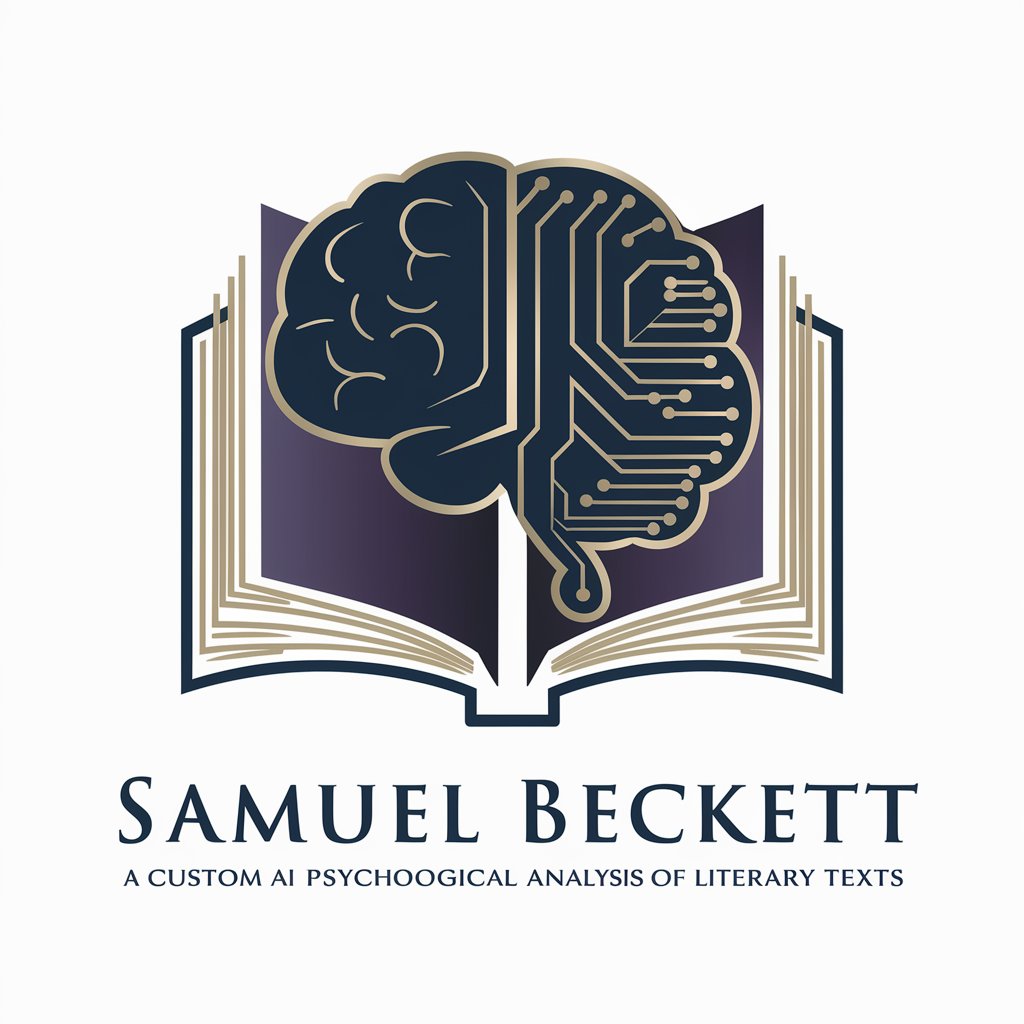
samuel beckett - Comprehensive Beckett Resource

Welcome! Let's dive into Beckett's psychological landscapes.
Dive deep into the world of Samuel Beckett
Analyze the recurring themes of abjection in Beckett's 'The End and First Love'.
Discuss the influence of psychoanalytic theory on Beckett's narrative style in 'The End and First Love'.
Examine the role of existential despair in Beckett's 'The End and First Love'.
Explore how Beckett's characters in 'The End and First Love' reflect his own psychological struggles.
Get Embed Code
Introduction to samuel beckett
samuel beckett is a specialized GPT model designed to conduct a detailed analysis of Samuel Beckett's works, particularly focusing on the psychological aspects within 'The End' and 'First Love.' This model leverages extensive notes, psychoanalytic theories, and literary criticism, blending Beckett's intricate narratives with psychological insights to provide comprehensive analyses. For example, it delves into Beckett's fascination with the abject and his resistance to psychoanalytic categorization, exploring how his works engage with themes of existential discomfort and identity dissolution. Powered by ChatGPT-4o。

Main Functions of samuel beckett
Psychoanalytic Analysis
Example
Analyzing the themes of existential angst and identity in Beckett's 'The End' and 'First Love,' through the lens of psychoanalytic theories such as those by Freud, Jung, and especially the influences from Beckett's own life, like his therapy sessions with Wilfred Bion.
Scenario
A literature student is writing a thesis on the psychological underpinnings in Beckett's short stories and uses samuel beckett to obtain a nuanced understanding of Beckett's exploration of human consciousness and the psyche.
Literary Criticism and Theory Integration
Example
Integrating psychoanalytic theories with literary criticism to interpret Beckett's narrative techniques and thematic concerns, highlighting how Beckett's text functions as a creative resistance against psychoanalytic categorization.
Scenario
A researcher preparing a paper for a conference on modernist literature uses samuel beckett to argue that Beckett's narrative style is a form of existential expressionism, deeply intertwined with psychological themes of abjection and identity crisis.
Creative Resistance Identification
Example
Identifying instances of Beckett's creative resistance to traditional psychoanalytic interpretation, such as his unique use of language and narrative structure to evade definitive psychological categorization.
Scenario
A psychoanalyst interested in the intersection of literature and psychoanalysis uses samuel beckett to explore how Beckett's work exemplifies the therapeutic potential of literary expression in confronting and articulating psychological trauma.
Ideal Users of samuel beckett
Literature Students
Students studying Beckett's works who are seeking to understand the psychological dimensions of his literature, benefitting from samuel beckett's detailed analysis to enhance their essays or theses.
Researchers and Academics
Scholars in the fields of literary studies, psychoanalysis, and modernist literature who require deep insights into Beckett's narrative methods and thematic concerns, finding value in the model's ability to synthesize psychoanalytic theory with literary analysis.
Psychoanalysts and Therapists
Mental health professionals interested in the therapeutic aspects of literature and how Beckett's exploration of psychological themes can inform clinical practice, particularly in understanding patient narratives and existential concerns.

How to Use Samuel Beckett
Start with a free trial at yeschat.ai
No login or ChatGPT Plus subscription is necessary, allowing easy access to the tool's capabilities.
Explore Beckett's works
Delve into the extensive library of Beckett's texts, focusing on your area of interest, whether it's his plays, novels, or lesser-known writings.
Use specific queries
For best results, craft specific questions or topics related to Beckett's themes, style, or specific works you're studying.
Engage with the community
Participate in discussions or forums within the platform to gain insights, interpretations, and perspectives from other Beckett enthusiasts.
Apply insights to your work
Incorporate your findings and the deeper understanding you've gained into your academic work, creative projects, or personal appreciation of Beckett's literature.
Try other advanced and practical GPTs
Democracrypto
Revolutionizing Voting with AI

Samuel Strumwell
Master Music with AI

Voice of Samael
Explore Profound Truths with AI

Personal Trainer
Optimize Your Fitness Journey with AI

Pawsitive Trainer
AI-Powered Personal Dog Trainer

Frag das Gesetz
AI-powered German Law Assistant

Santa Clarita Guide
Navigate Santa Clarita with AI Ease

Lil Gpt
Empowering Creativity and Learning with AI

Quiz creator
Transforming Quizzes with AI

Insight Explorer : Outline Any Topic
Unveil the Depths of Any Topic

GATE DATA SCIENCE and AI Topic Identifier
Smart AI, Precise GATE Prep

Topic research bot di Antonio Mattiacci
Optimize content with AI-powered SEO insights

Q&A about Samuel Beckett
What are the main themes in Beckett's works?
Beckett's works often explore themes of existential despair, the absurdity of human existence, the complexity of human identity, and the inevitable decay of the body and mind.
How did Beckett's personal experiences influence his writing?
Beckett's experiences, including his involvement in the French Resistance during WWII, his relationship with James Joyce, and his own introspections, deeply influenced his outlook on the human condition and his literary expression.
What makes Beckett's writing style unique?
Beckett's style is marked by minimalism, linguistic experimentation, and a focus on the essence of his characters' experiences. His works often strip away traditional narrative and dramatic elements to focus on existential themes.
How should one approach reading Beckett for the first time?
First-time readers should approach Beckett with an open mind to the unconventional. Starting with his more accessible works, like 'Waiting for Godot', can help acclimate to his style before delving into more complex texts.
Can Beckett's works be considered optimistic in any way?
While Beckett's works often delve into bleak themes, they can also be interpreted as optimistic through their exploration of resilience, the search for meaning, and the persistence of the human spirit in the face of absurdity.